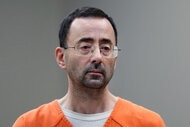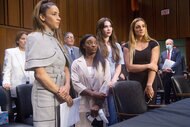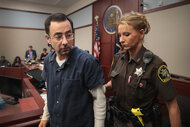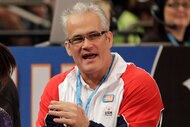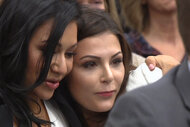Create a free profile to get unlimited access to exclusive videos, breaking news, sweepstakes, and more!
Who Is Gymnast Trinea Gonczar And Why Was It So Difficult For Her To Face Larry Nassar?
“He does that to me all the time! You're fine!” Trinea Gonczar recalled saying in HBO's "At the Heart of the Gold."
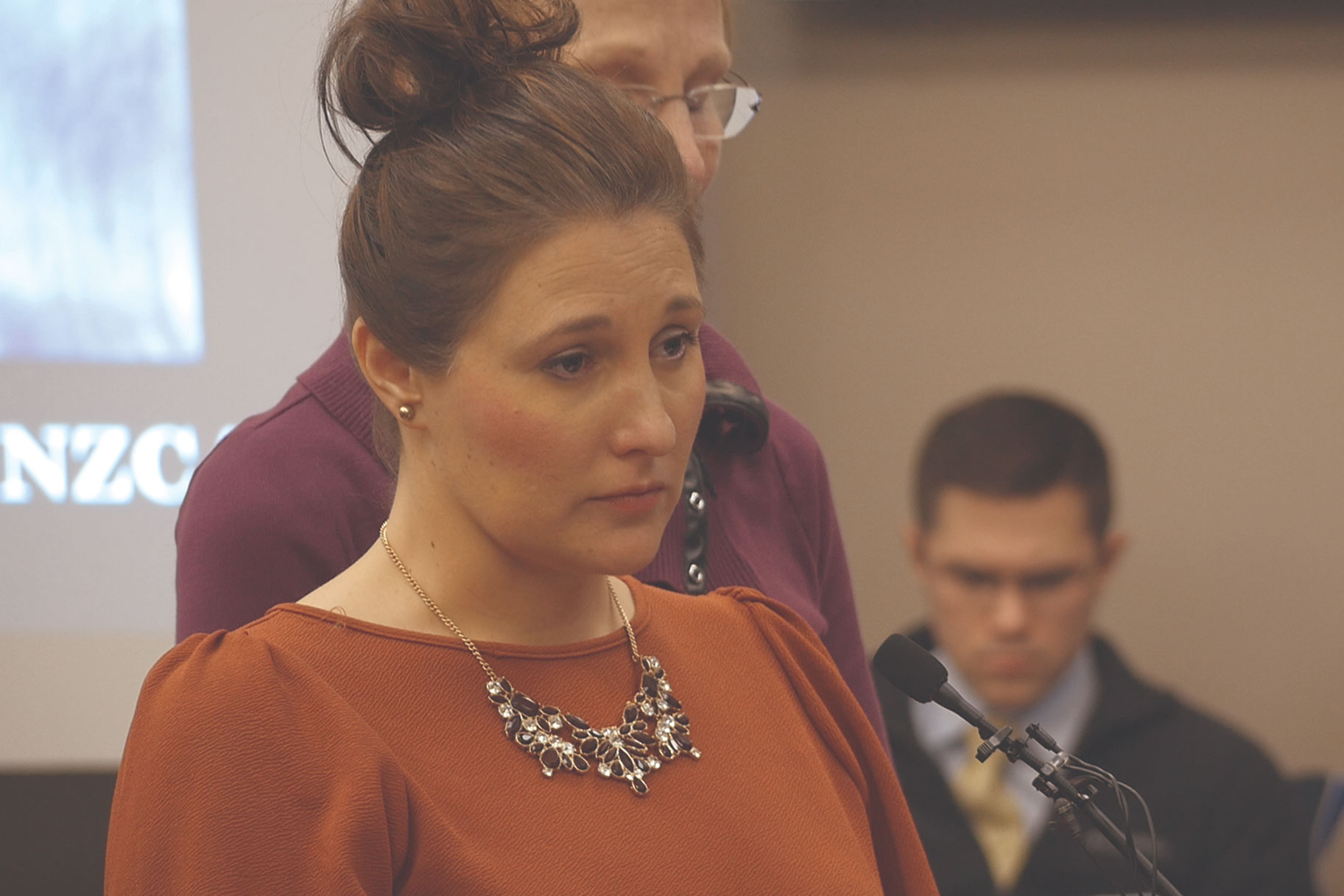
The impact statements read at Larry Nassar's trial in 2018 detailed the horrific instances of abuse perpetrated by the former USA Gymnastics doctor. The painful testimony from scores of women who suffered because of Nassar's crimes garnered international attention. The task at hand ever since his conviction has been to unravel the mystery of how, exactly, he was able to get away with such heinous behavior for so long.
This is precisely the question at the center of Erin Lee Carr's new HBO documentary, "At the Heart of the Gold." Amongst the many people interviewed in the new film is Trinea Gonczar, a victim of Nassar's whose story has become a focal point for understanding the situation writ large. Who is Trinea Gonczar and how did she come to know Nassar in the first place?
Trinea Gonczar is a gymnast who was treated by Nassar over 800 times for pain and injuries incurred during her career over the course of decades, according to The Huffington Post. She had trained at the Twistars club (where Nassar volunteered) in Lansing, Michigan from the age of 6, according to The Cut. While John Geddert, the head coach at Twistars, was known for cruelty, Nassar became available to the young athletes as a less harsh and much more jovial counterpart. When Gonczar was 9-years-old and her injuries were more serious, he began inviting her back to his home for private care. Gonczar developed a loyalty to Nassar because, according to her, the treatments ultimately worked.
“Larry fixed my ankles,” Trinea said to The Cut. “He fixed my shins. He fixed my knees. He fixed my shoulders. He fixed my wrists. We called it ‘the magic of Larry’ — he could fix you so you could compete. And I always wanted to compete.”
Nassar remained a supportive figure in the background of Gonczar's life, even accompanying her to a major surgery at the age of 15, according to The Cut.
Gonczar now remembers other girls telling her about some of the more questionable procedures performed on them.
“He does that to me all the time!” she recalled saying in "At the Heart of the Gold." “You’re fine.”
In "At The Heart Of The Gold," Gonczar wonders how Nassar managed to manipulate her so thoroughly, sometimes even with her mother in the room.
"I'm trying to remember back to these 'treatments.' I'm thinking back, like, 'How the heck didn't any — how did he do that?' And then I remember, I don't think there was a silent moment. I mean, I don't think he ever stopped talking. 'What's happening today? How's your family?'"
When Nassar was ultimately arrested in September of 2016, hard drives containing 37,000 images of child pornography included pictures of Gonczar, according to NPR. But before his capture, Gonczar was stunned to have learned that Nassar had been accused of anything at all, despite having been one of the many subjects of his illicit gaze. And even though she was molested over what her lawyers estimate more than 840 times, Gonczar still considered Nassar somewhat of a confidant.
Gonczar believed that the treatments she received were legitimate wanted to believe there had simply been a misunderstanding.
"I felt really bad for our gym, you know, all these people that love this person, like, so much love for him," she said to NPR of the discovery. "You know, it's like when you really realized that there's another side to someone, and at that point I was kind of still like, I knew that it was not good. I knew that things were not good, and I knew that this had happened to me, but I was not in a space yet where I was like, 'I'm going to come forward.'"
Through therapy, Gonczar was able to confront the memories of her abuse that she had tried to ignore, deny, and repress, according to NPR. That's when she found the courage to talk to authorities about what had happened to her. As more victims began telling their stories about Nassar in 2017, her idealistic picture of the doctor changed.
"I was so furious. Like, I literally want to kill him at that moment to hear her story. I was just so angry for this poor girl," said Gonczar to NPR. "And, like, that's when I really transitioned myself into the decision of I can't support him anymore and I need to support the girls. Like, I need to be here for these girls. I need to make friends with these girls, like, I need to, however I can, be there for them."
"I started to have heavy guilt about other people that had come to me when I was younger ... And then I [began] thinking, 'Oh my god, did I silence these people? Did I stop them from stopping him?'" Gonczar added in "At The Heart Of The Gold."
Gonczar would go on to give a powerful impact statement during Nassar's sentencing. While Nassar had remained steadfast throughout his trial, Gonczar's words in particular appeared to sting.
"I had to make an extremely hard choice this week, Larry," she said to him in court in January of 2018. "I had to choose whether [to] continue supporting you through this or to support them: the girls. I choose them, Larry. I choose to love them and protect them. I choose to stop caring for you and supporting you. I choose to look you in the face and tell you that you hurt us, you hurt me. I hope you will see it from me in my eyes today that I believed in you always until I couldn't anymore. I hope you cry like we cry. I hope you feel bad for what you've done. I hope more than anything, each day these girls can feel less pain. I hope you want that for us, but this is goodbye to you, Larry, and this time it's time for me to close the door. It's time for me to stand up for these little girls and not stand behind you anymore, Larry.
"Goodbye, Larry. May God bless your dark, broken soul," she concluded.
In a conversation with WBUR Radio of Boston, Gonczar reflected on the importance of her confrontation with Nassar at court.
"That moment, for me, was 1000 percent between he and I," she said. "It was a moment that the world saw that was extremely heartbreaking for me and, to be honest, heartbreaking for him. I never understood that this person could be the same person as the person that did this to all these girls and did so much harm. But now, as I go forward, I can understand, for these other amazing ladies and athletes and women, how this ruined a part of their life because they didn't know him the same fashion that I knew him."
Speaking with HBO about her process of healing in the wake of the trial, Gonczar emphasizes the value of reconciliation on her well-being.
"Being with my fellow sister survivors has helped me tremendously," she said. "Our shared experience helps us to understand and support each other completely. It has also been very helpful to work with other survivors of sexual violence. They teach me something new about myself every day.
Gonczar also underscored the importance of trusting in victims when they speak up.
"People often think there is a more complex solution on how to help survivors, but really the most important thing is to listen to and believe them," she said. "I hope viewers see that more often than not, predators are closer and perhaps more familiar to us then people think. Most people imagine predators as strangers in a white van driving down the road; we think we could spot them clearly. But statistically they are usually people we already know and maybe even trust. I hope that by sharing our stories, viewers can learn how to prevent something similar happening to themselves or a loved one."
Nonetheless, Gonczar's relationship to her memories of Nassar remain complicated. In "At The Heart Of The Gold," Gonczar discusses her ambivalence.
"I find it hard to look at him as like a criminal," she says. "Aside from all of the things he did. Because that's not — I don't know another criminal. I don't know another serial child molester. He was so good at being who he was on the other side of that. He was, I mean, he was awesome. I hate even saying that because it's counter-intuitive of what the heck's happening to us. He was awesome. That's why we all loved him."
"At the Heart of the Gold" begins airing on HBO May 3.
